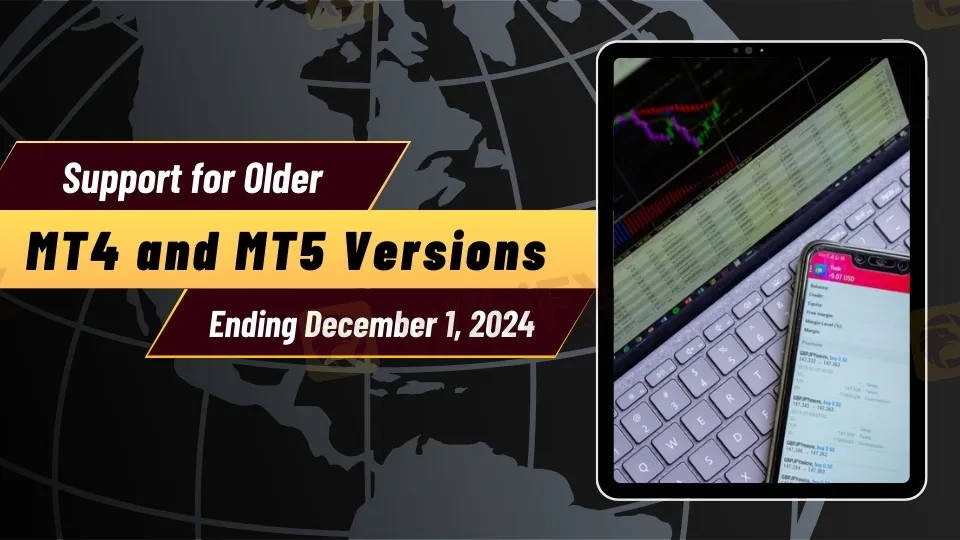简体中文
繁體中文
English
Pусский
日本語
ภาษาไทย
Tiếng Việt
Bahasa Indonesia
Español
हिन्दी
Filippiiniläinen
Français
Deutsch
Português
Türkçe
한국어
العربية
Support for Older MT4 and MT5 Versions Ending December 1, 2024
Abstract:MetaQuotes announces the end of support for older MT4 and MT5 versions by December 1, 2024. Forex traders must update to continue platform connectivity.

MetaQuotes, the company behind the popular MetaTrader platforms, has set a clear date of December 1, 2024, for the termination of support for older MetaTrader 4 and MetaTrader 5 versions. This change represents a big shift for forex traders, brokerages, and fintech professionals who depend on these platforms for day-to-day operations.
Update Required to Avoid Disruptions
Starting December 1, 2024, MetaTrader 4 build 1420 and MetaTrader 5 build 4410 will be the lowest supported versions. If traders and financial institutions continue to use outdated versions of desktop terminals, they will be unable to connect to broker servers, possibly interrupting trading activity. MetaQuotes highly urges customers to upgrade to the most recent releases as soon as possible to take advantage of the latest features and improved security.
MetaTrader 5 has received numerous key upgrades over the last year, including version 4410, which corrected issues and increased browser compatibility checks. These revisions included additional features such as crosshair mode, a line chart for online versions, and support for complex matrix calculations. Updating guarantees that forex traders using MetaTrader 5 are utilizing the most optimal and safe version possible.

Impact on Forex Trading and Fintech Professionals
This shift is projected to have an influence throughout key commercial centers, ranging from the United States and the United Kingdom to Southeast Asia and Australia. Brokerages, financial experts, and MQL4/MQL5 developers are advised to plan for the transition by ensuring that their systems satisfy the new MetaQuotes criteria. Aside from preserving connection, upgrading to the most recent builds will result in increased performance, fewer crashes, and overall better trading experiences.
For MetaTrader 4 users, the platform's recent updates have consistently delivered efficiency enhancements and security changes, notably for its Market service. As the December deadline approaches, keeping on top of these adjustments is critical for guaranteeing smooth trading operations.
About MetaTrader
MetaTrader 4 and MetaTrader 5 are two of the most popular forex trading platforms, with powerful charting, analytical, and trade automation features. Both platforms are extensively used by brokers and traders throughout the globe, and they provide a complete set of features for both beginner and expert traders. MetaQuotes, the firm that created MetaTrader, updates the platforms on a regular basis to improve speed, provide new features, and increase security.

Disclaimer:
The views in this article only represent the author's personal views, and do not constitute investment advice on this platform. This platform does not guarantee the accuracy, completeness and timeliness of the information in the article, and will not be liable for any loss caused by the use of or reliance on the information in the article.
Read more

The Ultimate Guide to Automated Forex Trading in 2025
Modern markets are revolutionized by automated trading systems, which now execute 70-85% of all transactions. These advanced automated trading software solutions, commonly called trading robots or Expert Advisors (EAs), leverage algorithmic precision for automatic trading across forex, stocks, and commodities 24/7. By removing emotional interference and executing trades in microseconds, auto forex trading platforms create fair opportunities for all market participants. For those new to automated trading for beginners, these systems provide disciplined, backtested strategies while significantly reducing manual effort.

Anti-Scam Groups Urge Tougher Action on Fraudsters in UK
Anti-scam groups demand tougher police action on fraudsters as UK fraud rates surge 19%, targeting millions in a penalty-free crime spree exposed by a $35m scam leak.

Philippines Deports 29 Indonesians Linked to Online Scam Syndicate in Manila
Online scam groups in the Philippines trick Filipinos into gambling and love scams, from Manila to Bacolod, causing trafficking and pain as police fight back.

Why does your mood hinder you from getting the maximum return from an investment?
Investment decisions are rarely made in a vacuum. Aside from the objective data and market trends, our emotions—and our overall mood—play a crucial role in shaping our financial outcomes. Whether you’re feeling overconfident after a win or anxious after a loss, these emotional states can skew your decision-making process, ultimately affecting your investment returns.
WikiFX Broker
Latest News
How Crypto Trading Transforms FX and CFD Brokerage Industry
UK would not hesitate to retaliate against US tariffs - No 10 sources
FCA Warns Against 10 Unlicensed or Clone Firms
CySEC Warns Against 14 Unlicensed Investment Websites
Top Currency Pairs to Watch for Profit This Week - March 31, 2025
Will natural disasters have an impact on the forex market?
Philippines Deports 29 Indonesians Linked to Online Scam Syndicate in Manila
Navigating the Intersection of Forex Markets, AI Technology, and Fintech
Exposed: Deceptive World of Fake Trading Gurus – Don’t Get Fooled!
AI-Powered Strategies to Improve Profits in Forex Trading
Currency Calculator








